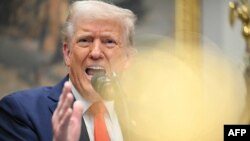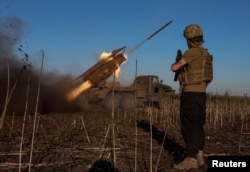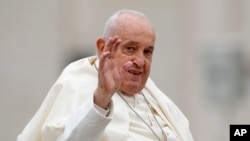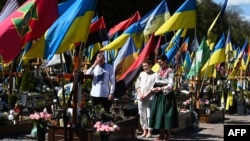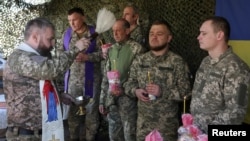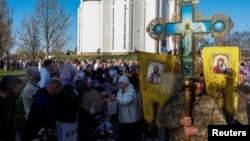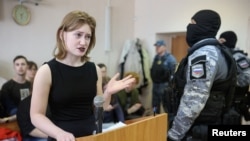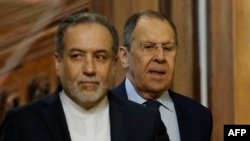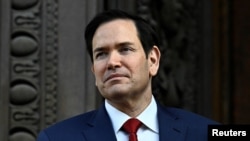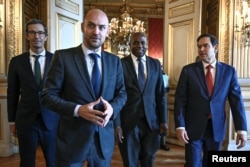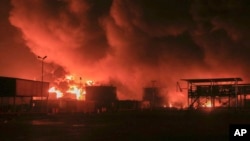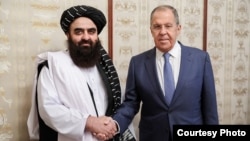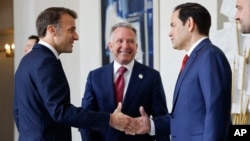Pope Francis died on Easter Monday at the age of 88 after battling a serious bout of double pneumonia.
Despite his illness, his death came as a shock after he had been driven around St. Peter's Square to greet cheering crowds on Easter Sunday.
"Dear brothers and sisters, it is with profound sadness I must announce the death of our Holy Father Francis," Cardinal Kevin Farrell announced on the Vatican's TV channel on April 21.
"At 7:35 this morning, the Bishop of Rome, Francis, returned to the house of the Father," he said.
Francis, who had also delivered a blessing at this year's Easter services a day before his death, was the 266th pope of the Roman Catholic Church and the first from the Americas, the first Jesuit, and the first pontiff born outside Europe in over a millennium.
At the Vatican, locals, tourists, and pilgrims visiting for Easter expressed their shock and grief.
"This is something that really hits you hard," Rome resident Emanuela Tinari told Reuters. "He was a pope who brought so many people closer to the church. He was not appreciated by everyone. But he definitely was by ordinary people."
Tributes have also been pouring in for the late pontiff from leaders around the world.
Russian President Vladimir Putin published a statement saying Francis "enjoyed great international authority as a faithful servant of Christian teaching, a wise religious statesman, and a consistent defender of the high values of humanism and justice."
"Throughout his pontificate, he actively contributed to the development of dialogue between the Russian Orthodox and Roman Catholic Churches, as well as constructive interaction between Russia and the Holy See," he said.
Ukrainian President Volodymyr Zelenskyy also praised the pope's tenure, describing the pontiff as someone who "knew how to give hope, ease suffering through prayer, and foster unity."
"He prayed for peace in Ukraine and for Ukrainians," he added. "We grieve together with Catholics and all Christians who looked to Pope Francis for spiritual support. Eternal memory!"
'Painful And Shameful' -- Pope Francis On The Ukraine War
Pope Francis, who died on April 21, Easter Monday, did not deliver his final annual Angelus address in person.
But the text of his address said the third anniversary of Russia’s full-scale invasion of Ukraine on February 24 was “a painful and shameful occasion for all of humanity."
He went on to voice “solidarity with the martyred Ukrainian people."
The Pontiff’s death-bed statement was his last attempt to give the Vatican a voice in the conflict.
While he was clearly sympathetic to the plight of Ukrainians, Pope Francis’ previous interventions were not always welcomed by Kyiv.
He raised particular ire in March 2024 by calling on Ukraine to find "the courage of the white flag” to enter peace talks with Russia.
He later said that the “first condition” for peace was that Russia “put an end to its aggression.” But earlier, his avoidance of specific criticism of Russia was a cause of frustration.
In June 2022, he condemned the “cruelty” of Russian forces while also suggesting the war was “perhaps somehow provoked.”
This echoed a Kremlin argument, repeatedly made without evidence, that it was forced to attack.
-- By Ray Furlong, senior international correspondent
"Rest in Peace Pope Francis!" US President Donald Trump said in a Truth Social post. "May God Bless him and all who loved him!"
Trump announced later on the same social media platform that he and first lady Melania Trump would attend the funeral of Pope Francis in Rome.
Trump's predecessor also praised Frances social media. "He promoted equity and an end to poverty and suffering across the globe," said Joe Biden, himself a devout Roman Catholic.
US Vice President JD Vance, who met with the pontiff on April 20, said his heart "goes out to the millions of Christians all over the world who loved him."
European Commission President Ursula von der Leyen said "the world mourns the passing of Pope Francis," adding that "he inspired millions, far beyond the Catholic Church, with his humility and love so pure for the less fortunate."
Moldovan President Maia Sandu also expressed regret at the news of Francis's death, saying that he had "tirelessly promoted compassion and social justice" and "led with love, stood by the vulnerable, and called for unity in times of division."
Her comments were echoed by French President Emmanuel Macron, who said the pope had been "a man of humility, on the side of the most vulnerable and the most fragile."
Incoming German Chancellor Friedrich Merz said Francis would be remembered for his "tireless commitment to the weakest in society."
UK Prime Minister Keir Starmer tweeted that he was "deeply saddened" by Francis's death.
Hungarian Prime Minister Viktor Orban responded to the news with a short a Facebook post that included a picture of him with the late pontiff. "Thank you for everything, Holy Father," he said. "We bid you farewell."
An Iranian foreign ministry spokesman voiced sadness over Francis's death, saying that he offered "condolences to all Christians around the world."
Turkish President Recep Tayyip Erdogan said Francis was "a spiritual leader who gave importance to dialogue between different faith groups and took the initiative in the face of humanitarian tragedies, especially the Palestinian issue and the genocide in Gaza."
Azerbaijani President Ilham Aliyev, Kosovar President Vjosa Osmani, Georgian Prime Minister Irakli Kobakhidze, and Montenegrin Prime Minister Milojko Spajic also posted tributes to the pope.
A Papacy Focused On Social Justice
Born Jorge Mario Bergoglio, the son of Italian immigrants in Buenos Aires, Argentina, Pope Francis worked as a chemical technician before entering the Jesuits in 1958.
He was ordained a priest in 1969 and became the provincial superior of the Jesuits in Argentina from 1973 to 1979.
In 1998, he was appointed archbishop of Buenos Aires. Three years later, he was elevated to the College of Cardinals by Pope John Paul II.
Elected Pope in 2013, following the resignation of Pope Benedict XVI, he chose the name Francis in honor of Saint Francis of Assisi, reflecting his commitment to humility and the poor.
His papacy was marked by a focus on mercy, social justice, and environmental stewardship.
In 2015, Pope Francis issued the encyclical “Laudato si’,” calling for global action on climate change and care for the environment.
He also emphasized interfaith dialogue, notably signing the Document on Human Fraternity with the Grand Imam of Al-Azhar in Egypt, Ahmed el-Tayeb, in 2019, a landmark agreement promoting peace and coexistence among different faiths.
'A Poor Church For The Poor'
Pope Francis was known for his pastoral approach, advocating for a “poor Church for the poor” and reaching out to marginalized communities.
He made efforts to reform the Vatican’s financial systems and address alleged clerical sexual abuse within the church.
In 2025, he published his autobiography, “Hope,” offering insights into his life and papal mission.
In his later years, Pope Francis faced several health challenges.
In 2021, he underwent colon surgery to address diverticulitis, and in 2023, he had abdominal surgery to repair a hernia. He also experienced chronic knee and back pain, often using a wheelchair for mobility.
Despite these issues, he maintained a rigorous schedule, continuing his pastoral duties and international travels.
In early 2025, Pope Francis was hospitalized with a polymicrobial respiratory tract infection, which developed into double pneumonia. His condition remained complex, requiring an extended hospital stay. He had been discharged from hospital on March 23.
With reporting by Reuters






